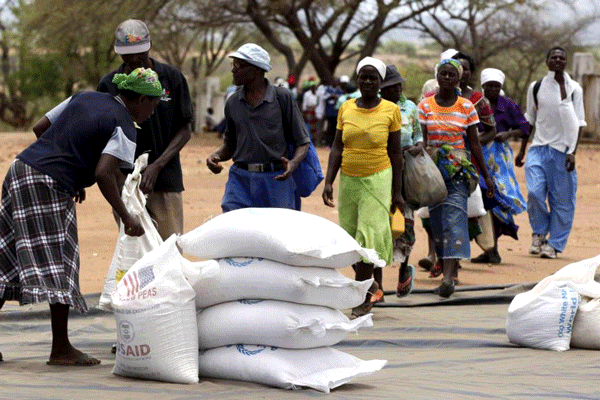
THE World Food Programme (WFP) has extended its relief programme in a bid to mitigate the adverse effects of El Nino, which has seriously affected the food security situation in the country.
BY STAFF REPORTER
“Many rural communities are in the grip of hunger and this is set to continue into next year,” Eddie Rowe, WFP Zimbabwe country director, said.
“We’re working with the government and donors to mobilise assistance to the most vulnerable, but to reach all those in need, we are dependent on the donor community continuing to fund our operations.”
WFP’s seasonal relief, designed to help vulnerable people through the difficult pre-harvest months, runs from October to March, but will continue running throughout the year and into next year.
The move will be a huge relief for vulnerable people with reports that more than four million will require food assistance until the next harvest.
Last month the Zimbabwe Vulnerability Assessment Committee (ZimVAC) said 2,8 million people do not have enough to eat and have little or no guaranteed access to food.
Following this grim report, WFP said it will this month be providing food and cash-based assistance to 730 000 vulnerable people.
- Chamisa under fire over US$120K donation
- Mavhunga puts DeMbare into Chibuku quarterfinals
- Pension funds bet on Cabora Bassa oilfields
- Councils defy govt fire tender directive
Keep Reading
Operations are being scaled up to reach an estimated 2,2 million people in the early months of next year, with the government and development partners assisting the rest.
However, for WFP to provide assistance through to March 2017, $220 million in funding would be required.
Already contributions have been received from the governments of Zimbabwe as well as Canada and Switzerland, the UN Central Emergency Response Fund and the United States.
The country’s high level of food insecurity is due to last year’s bad harvest — 50% down from the previous year — combined with the El Niño weather phenomenon, which has resulted in reduced rainfall in Southern Africa.
Coinciding with the growing season, El Niño-related drought has been disastrous for smallholder farmers, who are dependent on rain-fed agriculture.
Though the full impact of the drought will not be measurable until after the harvest, the prevalence of acute malnutrition among children aged under five stands at 5,7%, the highest level in 15 years.
There are also reports of many children dropping out of school because of hunger.
Meanwhile, WFP is working with rural communities to strengthen their resilience to climactic shocks. This is the fourth year of WFP’s productive asset creation programme, which provides training on the creation and rehabilitation of assets including vegetable gardens and irrigation schemes.
This year, 30 000 households are receiving food and cash assistance while participating in the scheme.










